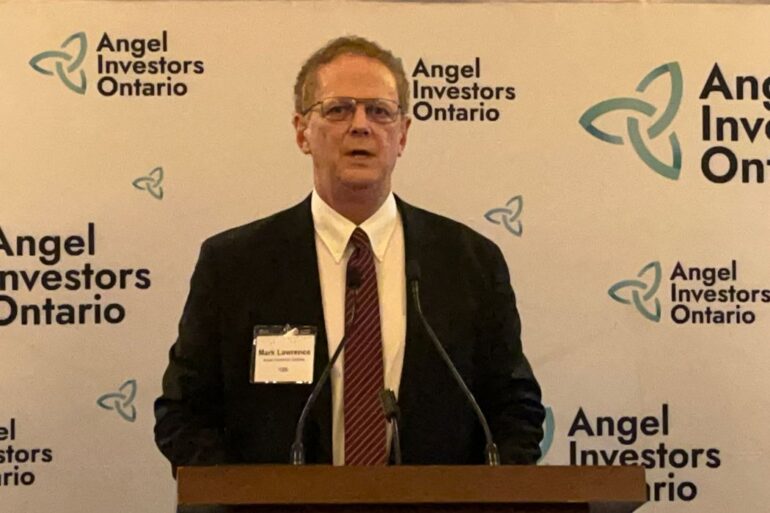With its current government funding set to expire at the end of March and no new commitments yet, Angel Investors Ontario (AIO) is in the midst of a leadership transition.
The angel investor group has brought on Mark Lawrence as its interim executive chair, replacing longtime president and executive director Jeffrey Steiner, who is stepping down. The change comes as AIO awaits word from the federal and provincial governments as to whether it can expect to receive more financial support.
Lawrence assumed leadership of AIO at the beginning of February, and Steiner is supporting the transition in the coming months. According to Lawrence, Steiner’s departure was a personal decision and will give him more time to dedicate to other commitments.
While AIO is not closing its doors come April 1, Lawrence acknowledged these circumstances leave its longer-term future uncertain.
In an interview with BetaKit, Lawrence said he was asked by AIO’s board of directors to take on the paid role on an interim basis after its board concluded it was “not the right time” to look for a new permanent leader given AIO’s presently precarious funding situation.
AIO relies heavily on the Government of Canada (via FedDev Ontario) to support its operations.
FedDev Ontario currently provides over 90 percent of AIO’s funding, with the remainder coming from sponsors. But according to Lawrence, the feds’ current commitment to AIO concludes at the end of March, and no new financing has been promised yet.
Lawrence said that AIO is not closing its doors come April 1, but acknowledged that these circumstances leave the organization’s longer-term future uncertain at the moment. He said AIO has built “some contingencies” to allow it to keep operating in the meantime and continue hosting the events it has planned without any new government funding. “But to attract a new executive and to continue full force on all of the programs we’d like to do—we can’t do that.”
“We can’t make long-term commitments on some things going into the distant future until we know, at least further, whether we’re getting funding, and the second degree is when is that coming,” added Lawrence.
Steiner is departing AIO after 12 years at the helm. Lawrence noted that he “[has] been and continues to be a very valuable contributor to the organization,” describing Steiner’s dedication to the overall health of Ontario’s angel investing ecosystem as “tremendous.”
RELATED: Brampton angel group launches with support from Angel Investors Ontario
As Lawrence was already involved with AIO—having been associated with the organization for the past 10 years and served as its volunteer chair over the last four—he said it made sense for him to step in and steer AIO through this period of uncertainty on an interim basis.
For nascent technology companies, angel investors can play an important role in funding and supporting early-stage startups before traditional venture capital firms.
Created back in 2007 to help fuel the growth of Ontario’s angel investor ecosystem, AIO is turning 17 years old this spring. Today, the not-for-profit organization serves 18 local angel groups and 1,800 accredited angel investors across the province. In total, AIO claims that it has helped enable the investment of more than $800 million CAD into over 800 high-potential, early-stage startups, which have in turn created and retained more than 15,000 jobs.
For the first 10 years or so of its existence, AIO received funding from the province and the Government of Canada. But over the past five years—since Ontario’s Ford government cut all financial support to the organization and its local angel groups in 2019—AIO has only gotten money from the federal government.
RELATED: NACO and Angel Investors Ontario promised $5.4 million from FedDev
AIO, which has a small staff and volunteer board, currently receives about $800,000 per year from FedDev Ontario and puts most of that total towards programming and services for its local angel groups.
Lawrence argued that Ontario’s angel investor ecosystem needs a platform to organize, share best practices, make better decisions in what is already a particularly risky investment class, and mentor early-stage entrepreneurs and each other. AIO has provided such infrastructure for years, but without government support, continuing to do so will likely prove difficult.
He has already made this case to the feds and the province, pitched both on some other ways to support the ecosystem, and believes AIO has now “put our best foot forward.”
In the meantime, as it awaits decisions, Lawrence plans to focus on how AIO can remain relevant and adapt to changes in the angel investment ecosystem. “I’m looking forward to doing that so that we can figure out how we can become sustainable in the longer term and have less reliance on government funding, ultimately.”
UPDATE (03/01/24): This story has been updated to clarify that the interim executive chair role is a paid position.
Feature image courtesy Angel Investors Ontario.


